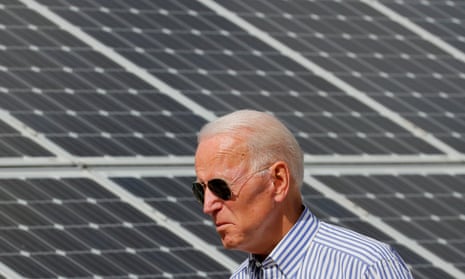Global carbon emissions from energy will peak in 2025 thanks to massively increased government spending on clean fuels in response to Russia’s invasion of Ukraine, according to analysis by the world’s leading energy organisation.
The International Energy Agency (IEA) said that government spending on clean energy in response to the crisis would mark a “historic turning point” in the transition away from fossil fuels, in its annual report on global energy.
The invasion of Ukraine has prompted an energy crisis around the world, with global gas prices initially surging. The crisis has caused steep inflation that has made households poorer around the world.
Governments have been scrambling to find other sources of energy. Some analysts have questioned whether fears over energy security could lead to the use of fossil fuels for longer, slowing the world’s race to net zero carbon emissions. Some countries – including the US and the UK under previous prime minister Liz Truss – have pledged to encourage fossil fuel extraction to try to ease prices.
However, Fatih Birol, the IEA’s executive director and one of the world’s most influential energy economists, said the energy crisis caused by Russia’s invasion “is in fact going to accelerate the clean energy transition”.
The IEA said planned investments in green energy in response to the crisis meant that – for the first time – government policies would lead to demand for polluting fossil fuels peaking this decade. The agency cited notable contributions from the US Inflation Reduction Act, the EU’s emissions reduction package, and actions by Japan, South Korea, China and India.
Q&AWhich countries contribute most to the climate crisis?
Show
China produces the most heat-trapping pollution, followed by the US. But historically, the US has contributed more carbon dioxide to the atmosphere than any other nation. The US also has high emissions per capita, compared to other developed countries. And Americans buy products made in China, therefore supporting China's carbon footprint.
Under the new plans investment in low-carbon energy such as solar, wind and nuclear power will rise to $2tn (£1.7tn) a year by 2030, an increase of more than 50% from today. However, annual clean energy investment would have to reach $4tn by 2030 to reach net zero carbon emissions by 2050, a figure that illustrates the scale of the challenge facing governments around the world.
The IEA analysis showed that current government policies would still lead to global temperatures rising by 2.5C, which would have catastrophic climate impacts. That would be far above the target of limiting global heating to 1.5C above pre-industrial levels. The 1.5C target, agreed at the Paris climate conference, would prevent the worst effects of climate breakdown.
The analysis adds to a consensus among scientists that governments are not doing enough to prevent climate disaster. A separate UN study, published on Wednesday, also found that government pledges so far to cut emissions will lead to 2.5C of heating.
The wave of clean energy investment will also cost Russia $1tn in lost fossil fuel revenues by 2030 compared with before the invasion, Birol said. Russia, previously the world’s largest exporter of fossil fuels, would have a “much diminished role in international energy affairs” as the world’s reliance on burning methane gas for power falls, he added.
after newsletter promotion
“The golden age of gas is approaching the end,” Birol said.
Birol said the crisis had not changed the IEA’s assessment, first published last year, that all new fossil fuel projects should stop immediately in order for the world to hit net zero emissions by 2050. New oil and gas extraction projects “will jeopardise our climate goals”, he said.
He also dismissed criticism from some climate deniers that spending on clean energy had contributed to higher energy prices, saying that argument was “hiding who sparked the energy crisis, which is Russia”. The IEA found that higher shares of renewable energy were correlated with lower electricity prices.
“None of the government leaders complained about too much clean energy,” Birol said. “They complain that they don’t have enough clean energy.”
